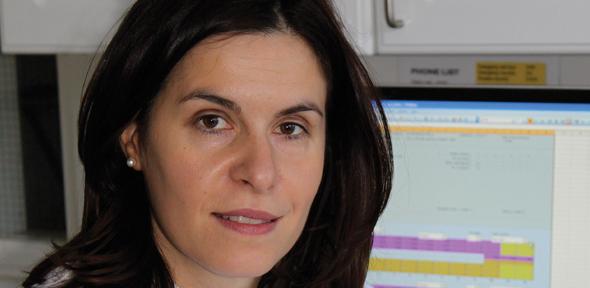
Athina Markaki from the Mechanics, Materials and Design Division has been awarded a €1.5 million grant from the European Research Council (ERC) to set up a 5-year research group under the ERC's 'Starting Independent Researcher Grant' programme.
The EU funding will enable me to build a group of students and post-docs to share in this exciting project. I certainly enjoy this type of research immensely and I would like to do this while carrying out research of real potential benefit for society.
Athina Markaki
Athina's project aims to improve the life span of prosthetic implants such as hip replacements. Bone is an active material, it responds to stresses and strains. In the absence of straining (this is also known as "stress shielding"), bone adjacent to implants can become unhealthy, contributing to loss of adhesion. (Orthopaedic implant loosening has two main causes - poor bonding and "stress shielding".) For implants to be successful and to last for a decent length of time, it is recommended that the patient should follow physical exercise regimes. In cases where the patient is completely immobile or with very restricted mobility, this is not possible. In these cases, drugs are often administered which can have side effects. Athina and her team are working on a therapy whereby controlled levels of mechanical strain could be induced directly in growing bone via the prosthesis itself.
The idea proposed in Athina's project is that the implant should have a highly porous surface layer, made by bonding ferromagnetic fibres together, into which bone tissue growth would occur. During the post-operative period, application of a magnetic field will cause the fibre network to deform elastically, as individual fibres tend to align with the field. This will impose strains on the bone tissue as it grows into the fibre network. Such mechanical deformation is known to be highly beneficial in promoting bone growth, providing the associated strain lies in a certain range (~0.1%). Preliminary work, involving both model development and experimental studies on the effect of magnetic fields on fibre networks, has suggested that beneficial therapeutic effects can be induced using field strengths no greater than those already employed for diagnostic purposes.
"Naturally, I was very happy to hear that my proposal had been accepted", Athina says. "The EU funding will enable me to build a group of students and post-docs to share in this exciting project. I certainly enjoy this type of research immensely and I would like to do this while carrying out research of real potential benefit for society." The project will be carried out in close collaboration with the Orthopaedic Research Unit (ORU), Department of Surgery, University of Cambridge.
The ERC encourages researchers to take risks in their research and go beyond established frontiers of knowledge and the boundaries of disciplines. The Starting Independent Research Grant scheme targets promising researchers in Europe who have the proven potential of becoming independent research leaders. The grant can mount up to 2 million Euros for setting up of a research group and all further costs related to conducting a pioneering research project.

